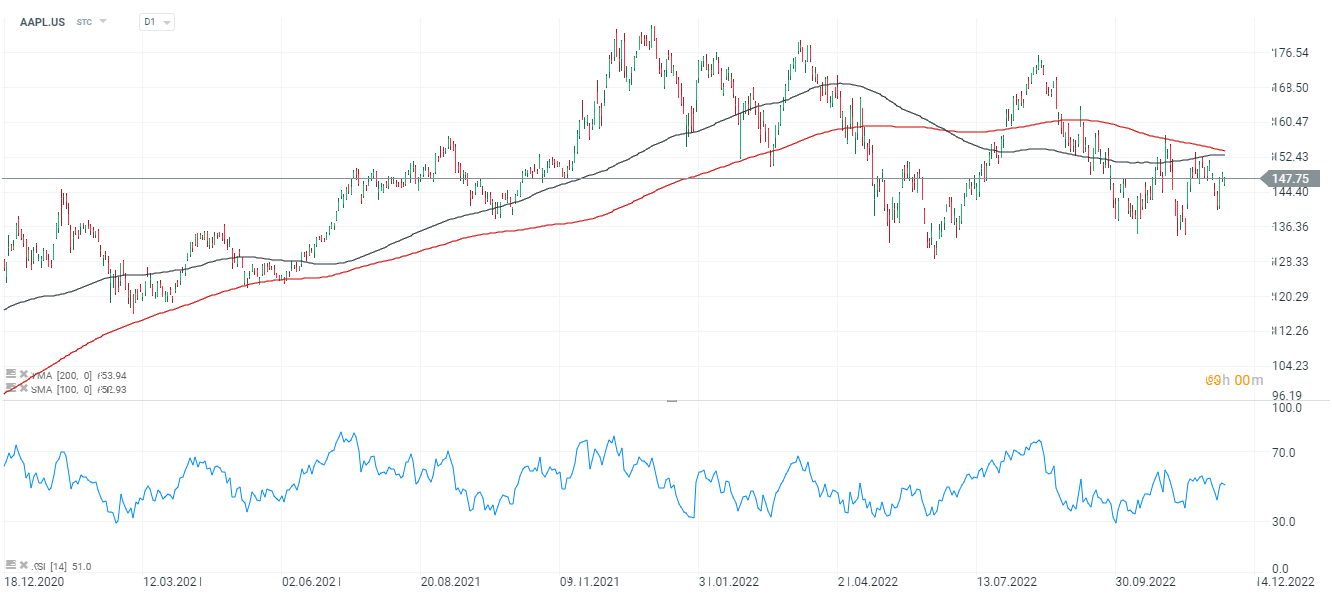In recent weeks, Apple has accelerated plans to move some of its manufacturing outside China. The Middle Kingdom has long dominated the Silicon Valley giant's supply chain. Faced with problems at its massive Zhengzhou plant, the company faces the prospect of creating a new 'iPhone City':
- Protests in Chinese cities that week abounded with slogans calling for the overthrow of President Xi Jinping, raising speculation around the creation of a broader anti-government movement in China. In addition, the crisis came at the height of more than 5 years of military and economic tensions between the US and China fueling Apple's 'crisis' fears;
- The United States continues to impose restrictions on Chinese goods placing particular emphasis on advanced semiconductors, the lack of which should eventually be felt by the Chinese economy and the development of Chinese technology. A survey conducted this year by the U.S - China Business Council found that U.S. companies' confidence in China has fallen to record lows, with 1/4 of respondents saying they would temporarily move part of their supply chain out of China in 2022;
- Confirmed by the Wall Street Journal, civil unrest in Zhengzhou, a city known through its massive iPhone assembly plant as iPhone City potentially helped fuel Apple's long-anticipated shift. At one point in Apple's history, 85% of all iPhone Pro's were assembled at the factory, with some 300,000 people still working there today;
- Although the Chinese authorities have bowed to waves of unrest and abandoned the most radical face of the zero Covid policy. However, the country ruled by Xi still raises quite a few risk factors for US manufacturers. Apple announced in mid-November that iPhone Pro shipments would be lengthened by restrictions in Zhengzhou. Already, delivery times for Apple's new smartphones have climbed to 15-year highs;
"In the past, people didn't pay attention to concentration risk (...) Free trade was the norm and things were very predictable. Now we have entered a new world" commented Alan Yeung, a former U.S. board member of Taiwan's Foxconn, the company that manages Apple's Zhengzhou factories and one of the key intermediaries in Apple's Chinese market.
- Problems caused by pandemic restrictions and energy supply shortages are faced not only by Apple but also by Chinese companies such as Luxshare Precision Industry and Wingtech Technology, which also want to seek diversification of production sources;
- On the other hand, locations like India and Vietnam may create unexpected problems due to the relocation of the entire supply chain. The slowing global economy and Apple's hiring slowdown could make it difficult for the giant to assign expert personnel to work with brand new suppliers, in new countries.
"Finding all the pieces to build the scale Apple needs is not easy," pointed out Kate Whitehead, Apple's former chief operating officer. Historically, the Beijing government and local authorities have supported the company's operations, seeing it as a driver of the economy and labor market. According to WSJ, support remains strong despite US-China friction. Even the populist 'People's Daily' praised Apple's Zhengzhou plant in a recent video:
"Timely government assistance ... constantly provides reassurance for multinational companies like Apple, as well as the global supply chain."
- The daily's report also pointed out that the company is directly and indirectly responsible for nearly 1 million jobs. According to Chinese state think tanks, Apple's intermediary Foxconn Group accounted for nearly 4% of China's exports in 2021. However, the Chinese labor market is becoming increasingly competitive and less attractive for Apple compared to other Asian locations. Wage demands of Chinese workers continue to rise and, along with covid restrictions, have been one of the causes of growing unrest among Zhengzhou factory workers.
- According to Wedbush analysts, China's covid policy so far has been a huge blow to Apple's supply chain, and November finally showed the weakness of concentrated production in the Middle Kingdom. Fourth-quarter iPhone shipments are likely to reach around 70 million to 75 million units, nearly 10 million less than forecasts before the Zhengzhou unrest. Particularly affected, of course, were to be the latest iPhone 14 Pro and Pro Max models. Although the Chinese government has already lifted some of the restrictions a key factory will not start operating with 30 to 40% employment until probably next month. A Foxconn executive indicated that hundreds of workers have been mobilized to immediately ship components and machinery to a factory 1,000 kilometers away in Shenhzen to 'bridge' part of the production gap.
There is no 'golden scenario'
Potential new Apple product 'assembly plant' locations under consideration are primarily India and Vietnam. The company is likely to avoid Taiwan, which could be a potential choice under standard conditions. At present, however, friction between Washington and Beijing raises difficult geopolitical risks in the Taiwan Strait. Apple's long-term goal is to produce more than 40% of its iPhones in India, compared to just single-digit today according to TF International Securities, which tracks the supply chain. Vietnam, in turn, would go into production of other devices such as MacBooks, AirPods and smartwatches. According to analysts and people connected to Apple's supply chain cited by WSJ, the company is no longer comfortable with a powerful manufacturing center in China, which is no longer seen as a stable and predictable business environment for foreign entities.
However, the business relationship between Apple and China has been going on for decades, and it's hard to expect the production transfer to go smoothly. Apple still wants to unveil new device models every year so moving production is a bit like servicing an airplane in flight. Former Foxconn director Dan Panzica pointed out that while Vietnam's manufacturing capacity is growing, the region still suffers from a labor supply problem due in part to its smaller-than-Chinese population. Apple's factory locations in Vietnam virtually preclude scale comparable to the Zhengzhou plant, thus complicating the supply chain. India, on the other hand, has no predictable government policy for handling foreign corporations, and Apple fears being saddled with liabilities by local authorities. The company faces the formidable challenge of building a new 'iPhone City' of satellite, smaller factories connected by new logistics and supply chain. Apple (AAPL.US) stock chart, D1 interval. The company's shares are experiencing weakness and are still below the 200-session average (red line). From the point of view of technical analysis, we can see that both moving averages SMA200 and SMA100 (black line) are approaching a bearish intersection known as the 'death cross,' which may herald a deeper weakening of investor sentiment. Source: xStation
Apple (AAPL.US) stock chart, D1 interval. The company's shares are experiencing weakness and are still below the 200-session average (red line). From the point of view of technical analysis, we can see that both moving averages SMA200 and SMA100 (black line) are approaching a bearish intersection known as the 'death cross,' which may herald a deeper weakening of investor sentiment. Source: xStation

Arista Networks closes 2025 with record results!

Daily summary: Silver plunges 9% 🚨Indices, crypto and precious metals under pressure

Does the current sell-off signal the end of quantum companies?

Howmet Aerospace surges 10% after earnings reaching $100 bilion market cap 📈
The content of this report has been created by XTB S.A., with its registered office in Warsaw, at Prosta 67, 00-838 Warsaw, Poland, (KRS number 0000217580) and supervised by Polish Supervision Authority ( No. DDM-M-4021-57-1/2005). This material is a marketing communication within the meaning of Art. 24 (3) of Directive 2014/65/EU of the European Parliament and of the Council of 15 May 2014 on markets in financial instruments and amending Directive 2002/92/EC and Directive 2011/61/EU (MiFID II). Marketing communication is not an investment recommendation or information recommending or suggesting an investment strategy within the meaning of Regulation (EU) No 596/2014 of the European Parliament and of the Council of 16 April 2014 on market abuse (market abuse regulation) and repealing Directive 2003/6/EC of the European Parliament and of the Council and Commission Directives 2003/124/EC, 2003/125/EC and 2004/72/EC and Commission Delegated Regulation (EU) 2016/958 of 9 March 2016 supplementing Regulation (EU) No 596/2014 of the European Parliament and of the Council with regard to regulatory technical standards for the technical arrangements for objective presentation of investment recommendations or other information recommending or suggesting an investment strategy and for disclosure of particular interests or indications of conflicts of interest or any other advice, including in the area of investment advisory, within the meaning of the Trading in Financial Instruments Act of 29 July 2005 (i.e. Journal of Laws 2019, item 875, as amended). The marketing communication is prepared with the highest diligence, objectivity, presents the facts known to the author on the date of preparation and is devoid of any evaluation elements. The marketing communication is prepared without considering the client’s needs, his individual financial situation and does not present any investment strategy in any way. The marketing communication does not constitute an offer of sale, offering, subscription, invitation to purchase, advertisement or promotion of any financial instruments. XTB S.A. is not liable for any client’s actions or omissions, in particular for the acquisition or disposal of financial instruments, undertaken on the basis of the information contained in this marketing communication. In the event that the marketing communication contains any information about any results regarding the financial instruments indicated therein, these do not constitute any guarantee or forecast regarding the future results.


